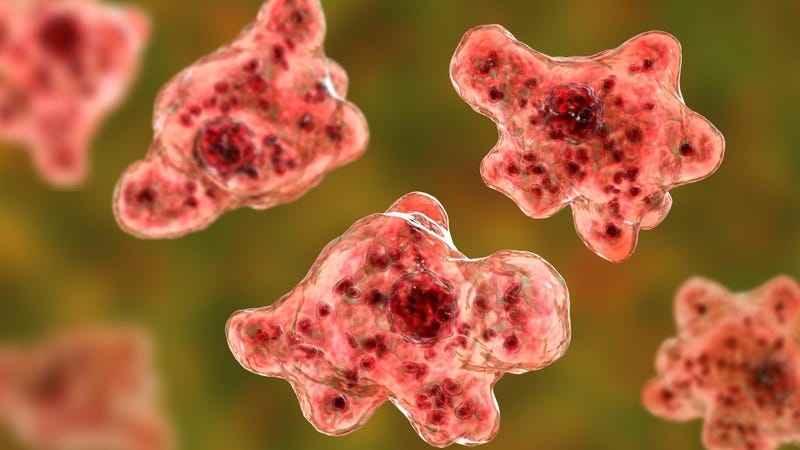
In what sounds like the plot of a horror movie, a person from Missouri was infected with a rare brain-eating amoeba that most likely occurred while swimming in an Iowa lake, according to the Associated Press.
The swimmer has been hospitalized and is in an intensive care unit after they were diagnosed with primary amebic meningoencephalitis, an often fatal infection caused by the Naegleria fowleri ameba.
The Iowa Department of Public Health released a statement on Friday, announcing the closure of the beach at Lake of Three Fires in Taylor County, and said they are testing for presence of Naegleria fowleri with the help from the Centers for Disease Control and Prevention (CDC).
"Effective immediately, the beach at Lake of Three Fires in Taylor County will be closed temporarily for swimming," the IDPH said. "The closure is a precautionary response to a confirmed infection of Naegleria fowleri in a Missouri resident with recent potential exposure while swimming at the beach at Lake of Three Fires State Park.
"Testing to confirm the presence of Naegleria fowleri in Lake of Three Fires is being conducted in conjunction with the CDC and could take several days to complete. The Iowa Department of Health and Human Services is working closely with the Department of Natural Resources to share information about this rare infection and will provide additional updates as test results become available."
Lisa Cox, communications director from the Missouri Department of Health and Senior Services, told the Des Moines Register that it's likely the swimmer was exposed to Iowa lake water over the last two weeks of June.
"It’s strongly believed by public health experts that the lake is a likely source, but we are not limiting the investigation to that source and it’s not confirmed," Cox said. "Additional public water sources in Missouri are being tested as well."
The IDPH went on to explain that "Naegleria fowleri is a microscopic single-celled free-living ameba that can cause a rare life-threatening infection of the brain called primary amebic meningoencephalitis (PAM)."
It can be found in any warm freshwater throughout the country, such as a lake or river, but contracting PAM is very rare.
"Since 1962, only 154 known cases have been identified in the United States. No additional suspected cases of PAM are currently being investigated in Missouri or Iowa," the IDPH said.
Out of the 154 known cases, only four people have survived, as "the fatality rate is over 97%, according to CDC statistics," per the AP.
"It’s the worst parasite in the world that we know of because it causes such devastating pathology," Christopher Rice, a research scientist in the Center for Drug Discovery at the University of Georgia, told the AP.
The IDHP said that the infection can happen if "water containing the ameba enters the body through the nose." It "then travels up the nose to the brain where it destroys the brain tissue."
The agency went on to provide a handful of suggestions to reduce the risk of infection, including holding your nose shut, keeping your head above water, and avoid activities in warm freshwater when it's very hot outside, causing the water temperature to be high. Symptoms include severe headaches, fever, nausea, vomiting, and a stiff neck.


